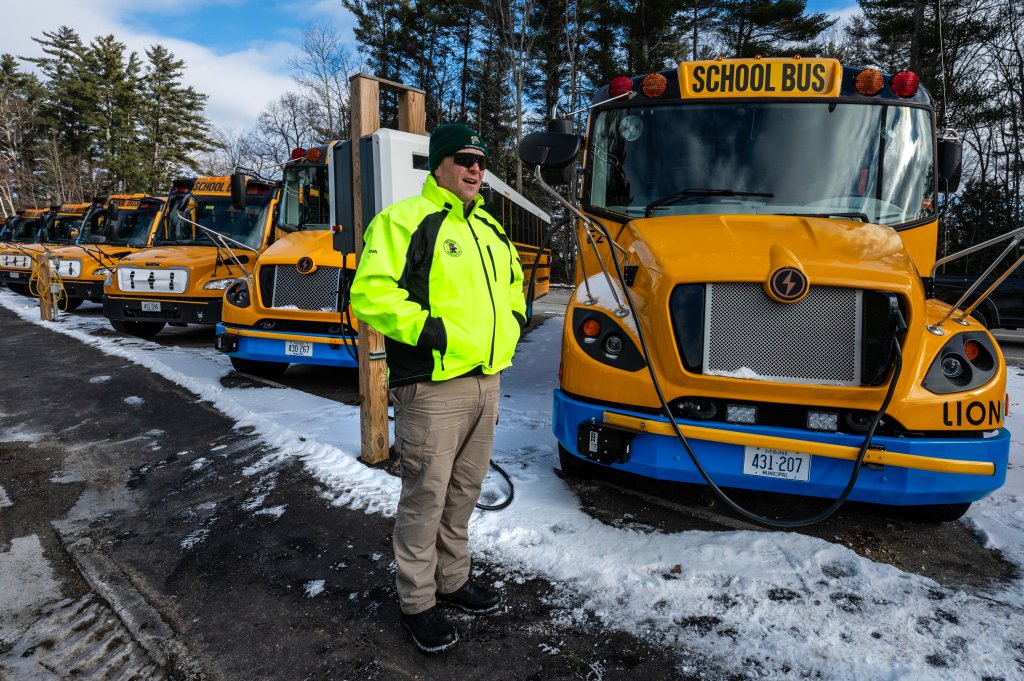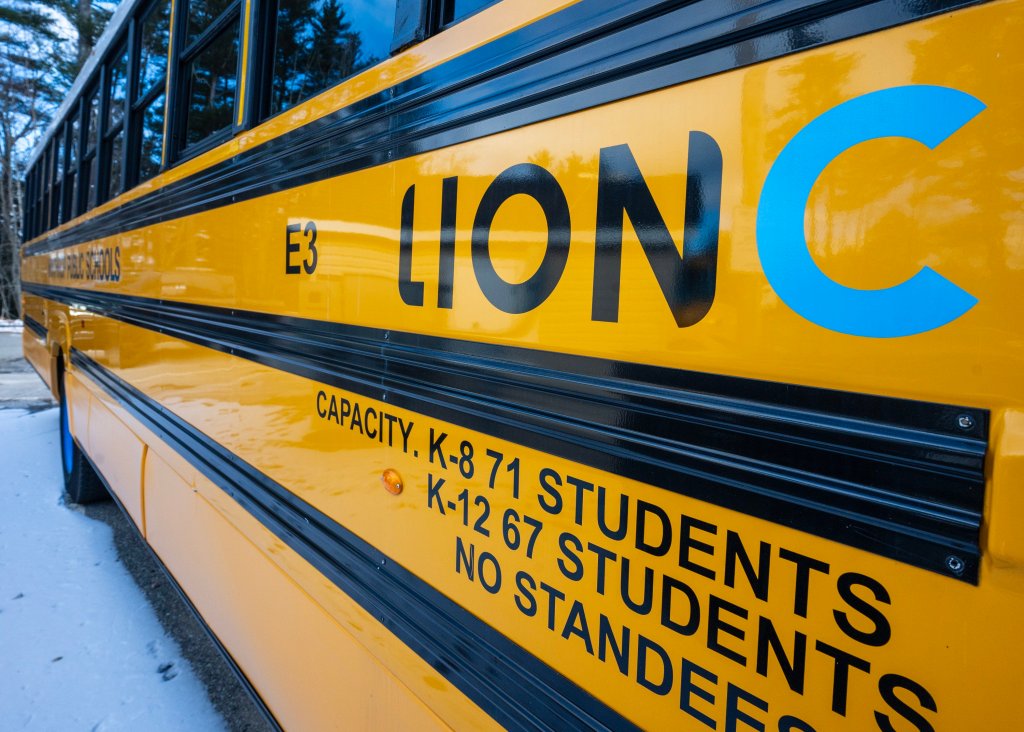
Nearly two years after problems emerged with Lion Electric school buses, school officials in districts across Maine say they have received no communication from state and federal agencies or the now-bankrupt Canadian company about what to do with the inoperable buses.
“We have put service tickets in, but I have yet to hear from them (Lion Electric Co.),” said Chris Storer, Yarmouth School Department’s transportation director.
Under the requirements of the federal Clean School Bus Program, districts were given the buses for free. But if they don’t use them, they must refund the cost of the buses, which are valued at $400,000.
And now Lion Electric Co., which sought bankruptcy protection in December 2024, is facing a class action lawsuit claiming officials supplied investors and customers with inaccurate information about the company’s financial situation and its supply chain status.
CHRONIC PROBLEMS, NO FIXES
The federal Clean School Bus Program, launched in the Biden administration, has offered grants for school districts to acquire electric school buses to reduce the number of diesel school buses across the country.
In Maine, several school districts applied and were granted buses from different manufacturers. Electric buses supplied by Lion Electric have been the only buses to experience problems. The Sheepscot Valley school district in Kennebec and Lincoln counties received two buses from Thomas Built Buses that the district has registered no problems with.
Yarmouth Superintendent Andrew Dolloff said in a note to parents that although the district’s buses still need repairs, the district has received $100,000 through the Internal Revenue Service’s electric vehicle rebate program. The electric buses will be evaluated by a local electric vehicle service provider, he said.
“While this money does not cover the cost of a bus, it does benefit the district financially and place us in a budget-positive position regarding the buses, as the only costs incurred by (the district) were approximately $36,000 to build EV infrastructure at the town garage and $25,000 for the consultancy and documentation that led to the IRS rebate,” Dolloff wrote.
Storer said that the only information he has heard about the situation is that Lion Electric is now focused on its Canadian products rather than the products shipped to the United States, and that the company is no longer honoring its warranty on the buses.
“We still have unknown answers as of what is actually wrong with the buses,” Storer said. “We still have the same faulty warnings of high voltage, loss of power, the same issues as before.”
Following its bankruptcy filing, the Quebec-based company no longer ships parts to school districts.
Public records requests revealed the problems with brake failures, high voltage warnings and other issues that made the buses inoperable started almost immediately after the buses were delivered and that messy communication from state and federal officials left school districts with more questions than answers.
From the start, the buses in Yarmouth only worked for a “day or two” at a time, he said.
Amanda Belanger, superintendent of Baileyville-area school district in Washington County, said the district is locked into two more years with the grant until she can figure out how to get rid of the buses.
The district was awarded three buses. The bus that serves the Waite area is parked and inoperable; a neighboring town has loaned the district a diesel bus. The charger for one of the two operable buses doesn’t work, so that bus uses the charger for the Waite-area bus.
Belanger said she has not heard from the state or the federal departments, either.
“I’m not sure who will buy something that doesn’t work,” she said.
Chloe Teboe, a spokesperson for the Maine Department of Education, confirmed that the state department has not received any communication from Lion Electric Co.
The state education department has limited ability to help districts because the grant was awarded by the U.S. Environmental Protection Agency, she said.
“The Maine DOE has made emergency bus purchasing available to affected (districts) through the Maine School Bus Purchase Program,” Teboe said. “More generally, the Department continues to serve as a resource for (districts) that are interested in moving toward an electric bus fleet by helping them to determine whether doing so is a viable option, based on staff capacity, local resources, planning required.”

Becky Foley, superintendent of the Winthrop Public Schools, said she is waiting to hear from the EPA whether the buses need to remain plugged in for two more years.
In the meantime, the district is using the state’s bus purchase program.
“We did not budget for any new buses for this current year,” Foley said, noting that the process was not started by her, but the former superintendent of the district. “We will get a third of the money from the cost of the buses each year for three years.”
EPA officials have said they are aware of the continuing issue.
“EPA understands Lion Electric’s bankruptcy has put school districts who chose that company as a vendor in a difficult position. EPA is actively monitoring the bankruptcy proceedings and evaluating all options to support impacted school districts,” the agency said in a statement.
LEGAL CHALLENGES
Now, Lion Electric Co. is the subject of a federal class action lawsuit over claims it provided inaccurate information to its investors about the company’s financial situation and its reliance on third-party suppliers, some of which are single-source suppliers.
The lawsuit alleges that executives and directors at Lion Electric withheld information about the problems that Lion Electric faced and mislead stakeholders by using “grossly unrealistic” financial projections and failed to provide, among other claims.
At the same time, a group of investors has bought the troubled company for $6 million in July. According to the report in CityNews Everywhere, Lion Electric’s market value had nearly reached $4.7 billion in June 2021. The purchase price means that creditors, including the Quebec government, will not recoup their losses.
The deal allows the company to continue making electric school buses at a plant in Quebec while laying off workers and closing other facilities.
A spokesperson for Lion Electric did not return a request for a comment.

We invite you to add your comments. We encourage a thoughtful exchange of ideas and information on this website. By joining the conversation, you are agreeing to our commenting policy and terms of use. More information is found on our FAQs. You can modify your screen name here.
Comments are managed by our staff during regular business hours Monday through Friday as well as limited hours on Saturday and Sunday. Comments held for moderation outside of those hours may take longer to approve.
Join the Conversation
Please sign into your CentralMaine.com account to participate in conversations below. If you do not have an account, you can register or subscribe. Questions? Please see our FAQs.